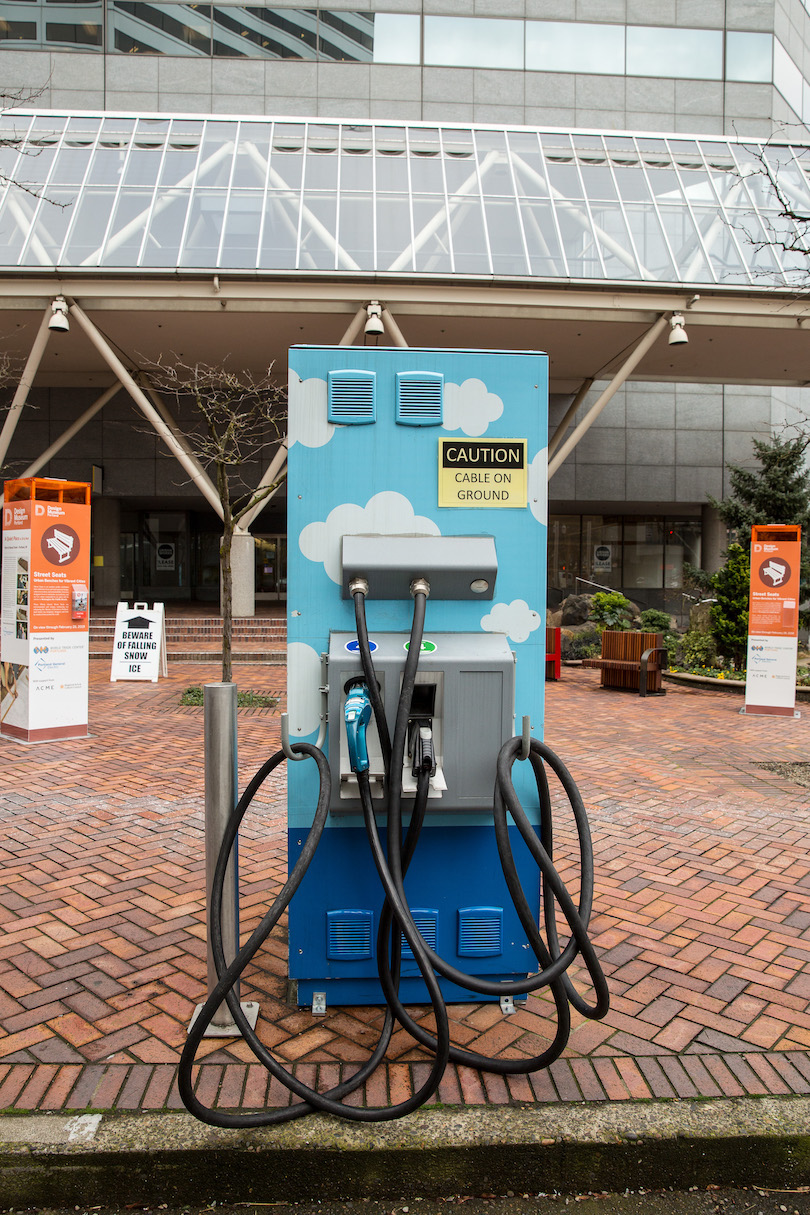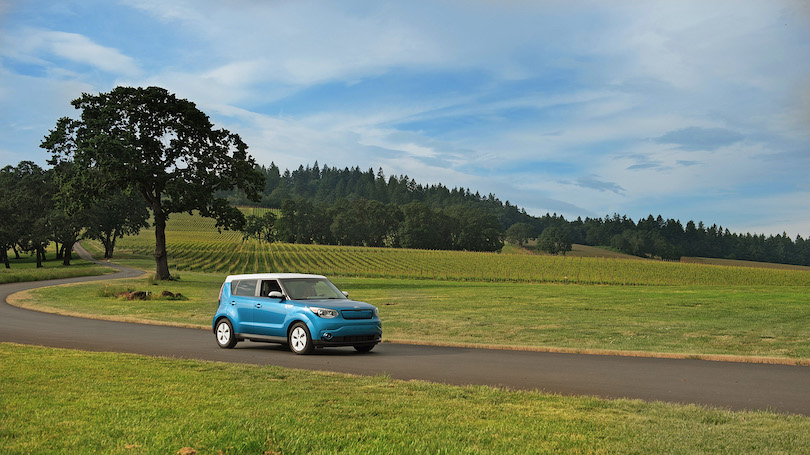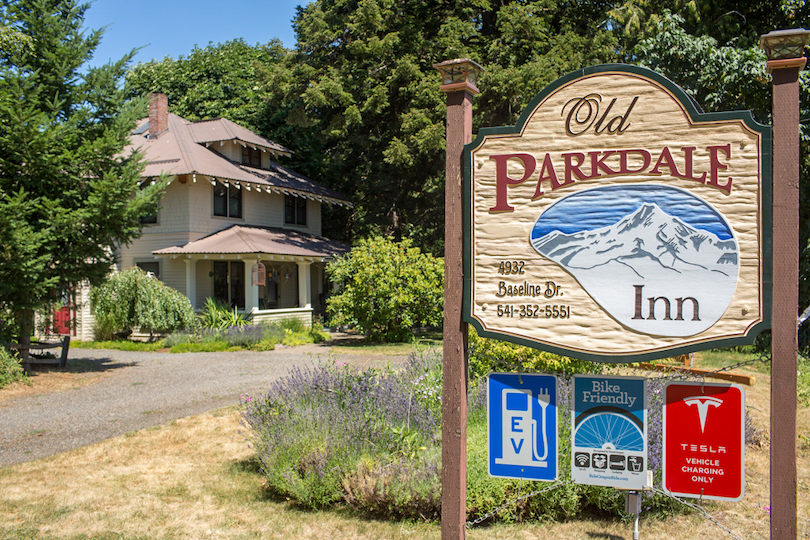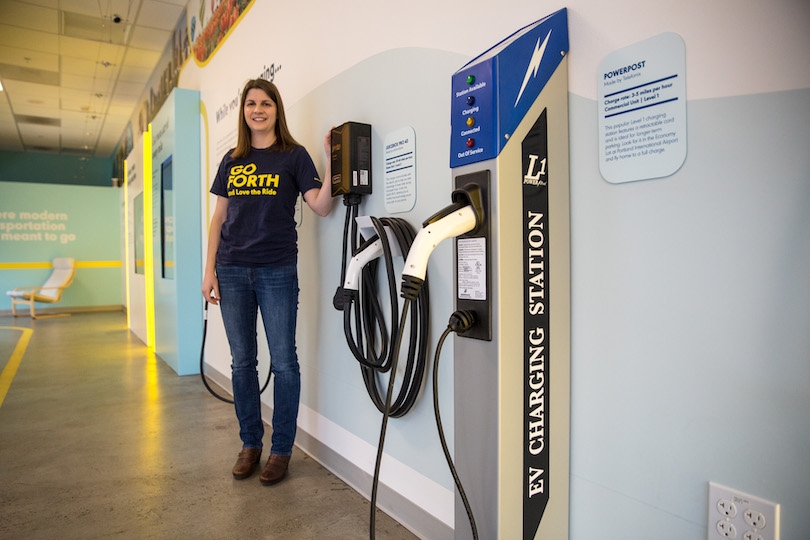Brand Story – Tourism is a major driver in promoting low-emission transportation
In 2018, Oregon had about 20,000 registered electric vehicles (EVs) on the road. By 2020, that number is expected to increase to 40,000. Oregon Department of Environmental Quality’s goal is to make every new car sale an EV by 2050. As EV models become more affordable—along with financial incentives for buyers, increased vehicle charge capacity and utility-funded charging stations—the optimism for wide-scale EV adoption is surging.
“In terms of demand, we’re at that point where EVs could soon see exponential growth,” said Zach Henkin, Deputy Director of Forth Mobility, a Portland nonprofit dedicated to advancing EV adoption. In Oregon, electric vehicle sales have gone up 35% since 2017. “It’s happening faster in Oregon than most of the country.”
 Electric vehicle charging station at Electric Avenue in downtown Portland
Electric vehicle charging station at Electric Avenue in downtown Portland
However, one of the major barriers for statewide adoption of EVs is “range anxiety”: the fear of running out of battery before reaching the next charging station. The current strategy for advancing electric vehicle infrastructure has been more conducive for residential commuting and urban transportation, as opposed to leisure travel to rural destinations across the state.
Travel Oregon recognized this need and saw the tourism industry as a way to overcome these barriers. First, they partnered with the Oregon Department of Transportation (ODOT) in 2014 to position fast-charging stations near tourism-facing businesses along the West Coast Electric Highway—an alternative fuel corridor along I-5 from Vancouver, B.C. to Baja California, Mexico.
Next, in 2015, they launched Oregon Electric Byways—six tourism-optimized routes on scenic roads that featured charging stations every 25-50 miles. Along the Electric Byways, visitors can explore 2,200 miles of rural Oregon—from the Willamette Valley to Southern Oregon to the Oregon Coast—while charging at wineries, hotels, breweries, and restaurants.
 Touring a vineyard in Kia’s new EV Soul
Touring a vineyard in Kia’s new EV Soul
“The goal of the Oregon Electric Byways program is to enable emissions-free travel along our state’s rural roads and scenic highways,” said Andrew Grossmann, Destination Management Specialist for Travel Oregon.
Not only did the Electric Byways program boost EV transportation to rural communities, it also provided visitors an opportunity to explore the destination, in turn supporting the local economy.
And while the Electric Byways program advanced Travel Oregon’s goal of promoting low-emission travel, a need remained to increase the availability of destination charging stations in rural Oregon.
To solve this problem, Travel Oregon partnered with Forth Mobility to create the Oregon Electric Vehicle Charging Station Rebate Program in 2017. The program provided up to $5,000 in rebates for tourism businesses that successfully applied to Forth Mobility and installed a Level-2 or DC fast-charging station available to the public.
Businesses were approved for rebates based on location as well as proximity to local amenities.
The first round of rebates was distributed in September 2018, and seven entities have successfully installed charging stations: Amity Flats (Amity), Estacada City Hall (Estacada), Pfeiffer Winery (Junction City), Old Parkdale Inn (Parkdale), Cedar Creek BBQ (Oakridge), River House Inn and Old Town Inn (both in Florence).
 Hotel room at Amity Flats
Hotel room at Amity Flats
Mary Pellegrini, co-owner of Old Parkdale Inn, had been wanting to install a charging station for more than six years, but couldn’t afford the installation costs out of pocket. Once this rebate became available, she finally had her opportunity. “Ever since we opened [in 2001], we’ve done everything we could to be completely sustainable,” said Pellegrini, whose bed & breakfast serves entirely local produce and utilizes reusable materials. “Having this station also puts our little community on the map.”
Being the middle point between Mt. Hood and the Columbia Gorge, Pellegrini expects to receive more visitors now that her business is a designated stop for destination charging. She also said the neighboring businesses are equally excited—as visitors have stopped to charge at her station, they also go to the local museum, dine at restaurants, and explore other nearby sights. “This benefits us all,” she added.
 Entrance sign at the Old Parkdale Inn
Entrance sign at the Old Parkdale Inn
Lynda Kamerrer, co-owner of Cedar Creek BBQ in Oakridge, is excited about the cross-community partnerships her charging station creates. “Now, we can approach EV manufacturers for potential partnerships, maybe even host driving demos out here,” she said. “Who wouldn’t want to drive those cars on our beautiful countryside roads?”
She added that the charging station not only increases Oakridge’s visibility, but also sends a message about her business’s brand. “This shows we’re on the forefront of the EV movement,” she said. “We’re a part of the group making careful decisions about the future health of the planet.”
Both Kamerrer and Pellegrini noted a “seamless” installation process, which was coordinated and contracted entirely by Forth Mobility and Travel Oregon.
In terms of meeting Oregon DEQ’s 2050 goal of zero emission vehicle travel, there’s still much work to be done. For now, entities are doing what they can to create change—from policies and financial incentives at the state and national level to charging station installation and EV adoption from drivers and local businesses. “This is a collective effort, and it’s not one person’s role to make this happen,” said Pellegrini. “If everyone did their part, even if it was just a little bit…could you imagine the possibilities?
Brand stories are paid content articles that allow Oregon Business advertisers to share news about their organizations and engage with readers on business and public policy issues. The stories are produced in house by the Oregon Business marketing department. For more information, contact associate publisher Courtney Kutzman.


